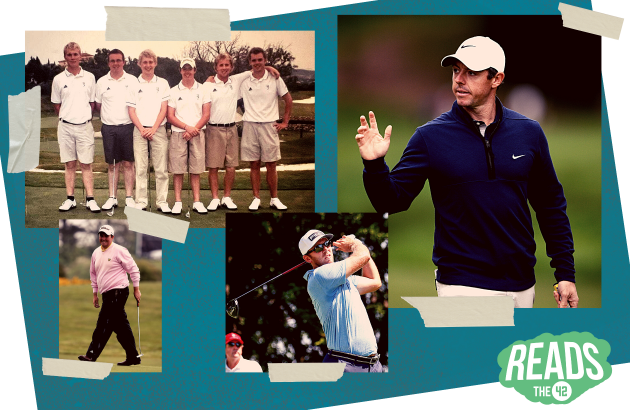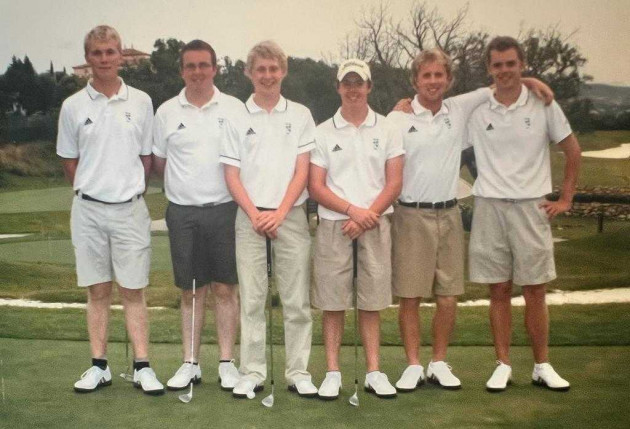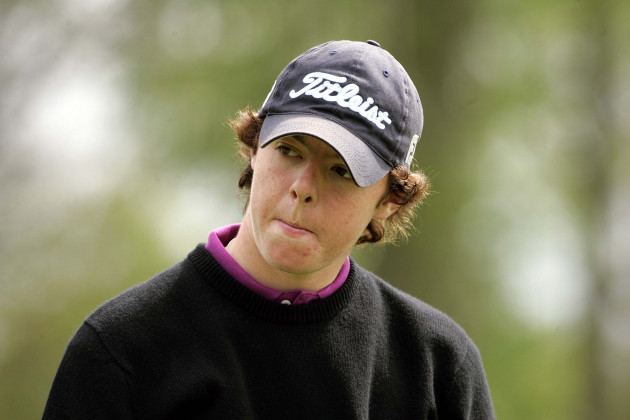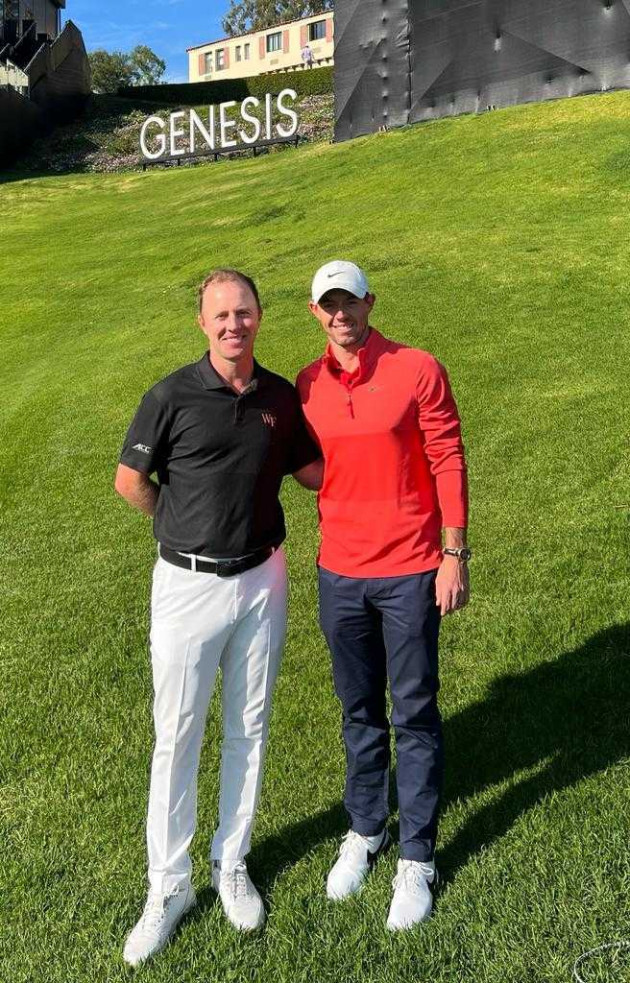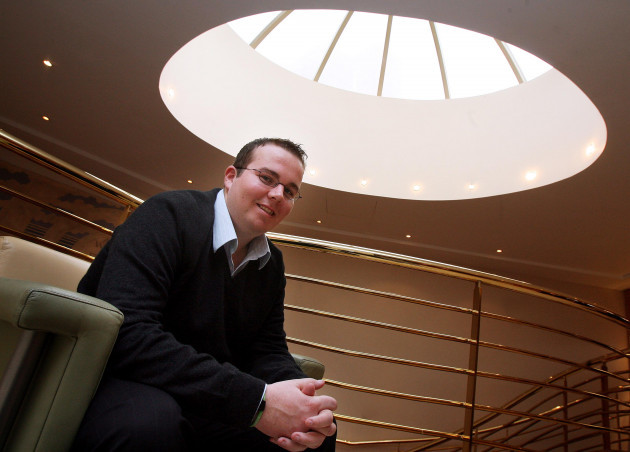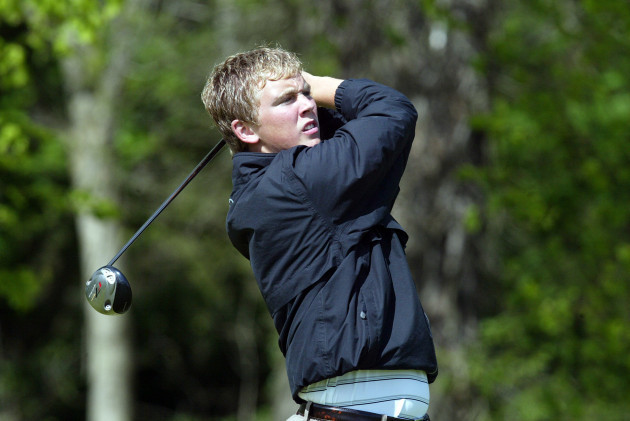THE EUROPEAN YOUTHS Team Championship isn’t staged anymore: perhaps its organisers took a look at the Irish team at the final edition in 2006 and decided they had seen all they would see.
Ireland didn’t win that year – they finished sixth – but you’ll find three names from that Irish team within the top 30 of the leaderboard at the Masters this year and among the contenders for the year’s second major at Southern Hills this week.
Aaron O’Callaghan was also a member of that Irish team 16 years ago, so did he ever expect that three of his team-mates would go on to tame the decorous, deceitful lands of Augusta National?
“Yeah, I did actually.”
Rory
It was July 2001, and O’Callaghan couldn’t sleep.
He was the leading player at the Ulster Boys’ Championship at Bangor, a ranking which had in theory earned him a relatively comfortable draw the following day. In theory.
His roommate, Cian McNamara, was playing too, and talk turned to tomorrow’s match-ups.
“He was laughing away saying, ‘Sure you’re fucked.’
“‘What do you mean?’
“‘You’re the hotshot. You’re after coming off here and shooting 66, you’re the number one seed and you’re going out against a 12-year-old tomorrow who’s probably going to beat you. You’re going to walk home with your head between your legs.’
“I said, ‘Well we’ll see about that.’ But I hardly slept a wink.”
The 12-year-old’s name was Rory McIlroy.
- See sport differently with The42 Membership and get closer to the stories that matter with exclusive analysis, insight and debate. Click here to find out more>
“I did get him in the end, but I had to play fantastically well,” remembers O’Callaghan. “I was probably 80 yards past him off the tee. But he was sending his little woods up around the greens, and just chipping it to to a foot and then all of a sudden I’d have to get down in two from 30 feet just to halve the hole. I birdied the 21st hole to beat him, but all I could think about all day was this guy, and that I was gonna get beaten here by a 12-year-old.”
Gareth Shaw was another member of that 2006 Youths’ team. “When you look back, he was always destined,” he says when asked if McIlroy was always fated for great things. Everybody knew it and Rory knew it too.
Also in 2006, Shaw and O’Callaghan played at the European Amateur Championships in Italy, which McIlroy won to book a spot at the Open in Carnoustie the following year. He led wire-to-wire, finishing with an aggregate score of 274, 18-under for the tournament. McIlroy later said something that jutted sharply out from the warm hum of congratulations.
I wanted to beat Tiger.
Woods had just won the US PGA Championship and was playing at the WGC-Bridgestone Invitational at Firestone that same week, winning with an aggregate score of 270, beating Stewart Cink in a play-off and a kid called Rory McIlroy by four shots.
“That tells you a little bit about his mindset,” says O’Callaghan. “He wasn’t thinking about being the best player in Italy that week. He was trying to be the best player in the world.”
In those days McIlroy’s reputation could weigh heavily on his rivals but he seemed to shuck it from his own shoulders like a few flakes of snow. Though between four and five years younger than O’Callaghan, Shaw, Lowry and Power, he grew up exquisitely unperturbed by it.
“It wasn’t like we had any jealousy, nothing more than a regular 16/17-year-old would have,” says O’Callaghan. “We all accepted the fact that he was the golden child and he was able to back it up. He was incredibly good and presented himself that way, that ‘I’m going to be one of the best players of all time.’ And you couldn’t argue with him when he’d go out there and he kept winning.”
“He had the swagger, he had the shots, he had it all,” says Shaw. But even in the early days, his Irish teammates and rivals could see the guy who would become golf’s man of multitudes; the man whose broad perspective on golf and life would make him among the most interesting people in a sport that demands myopia. He could be an unashamed show-off, says Shaw, recalling a day at Rosses Point when he was practising putts and McIlroy bounced over, took a putter in one hand and tapped a succession of balls in one-handed. “What are you trying to do, Gareth? This is so easy!”
And yet his obvious superiority and its attendant confidence never transfigured into arrogance or thoughtlessness. Shaw remembers rooming with McIlroy at an amateur tournament, during which he used the hotel phone to place a few transatlantic calls to his girlfriend in America. When he later went to reception to pay the bill, he was told McIlroy had already taken care of it.
“I saw him at the Irish Open at Fota in 2014, and hadn’t seen him since maybe 2008,” recalls Shaw. “We just talked away as normal. He remembered my mum and dad’s name, my brother’s name, small things like that. He hasn’t forgotten who he is and where he’s from. It was class.”
The recent years of McIlroy’s professional career have sometimes become about him trying to remember who he is.
Recall JP Fitzgerald’s words in helping McIlroy salvage his second round at the 2017 Open at Birkdale: “‘You’re Rory McIlroy, what the fuck are you doing?”
Or McIlroy’s own reflections last year, having won in Las Vegas weeks after a Ryder Cup that ended in a teary-eyed television interview: “I feel the last couple weeks I’ve realised that just being me is good enough, and maybe the last few months I was trying…not trying to be someone else, but maybe trying to add things to my game or take things away from my game. I’m capable of winning a lot of events on the PGA Tour and being the best player in the world.”
McIlroy won the last of his four majors in 2014, leaving him in a very lonely zone of Irish sporting lore: proven to be one his sport’s greatest-ever practitioners, and yet somehow a slight disappointment. “To be honest, he is better than just four”, says Shaw. “His talent and his natural ability to play the game is incredible. For me, sometimes he is trying to be someone he is not, and not playing his natural game. On par-fives, he is sometimes picking five irons, but sometimes I think, ‘play a little more safe Rory, take a wee birdie here and move on.’ But the odd double gets thrown in.”
Rory the Amateur and Rory the Pro are most clearly juxtaposed at Royal Portrush. It was there he turned his amateur reputation into real legend in real time, and also there he walked away from the Open Championship on the wrong side of the cutline and in tears.
O’Callaghan attributes McIlroy’s opening-round 79 to a coalition of unfriendly conditions, expectation, and the sport’s abiding ignorance.
“Rory is a student of the game: he could tell you every major winner all the way back, and always was like that. He probably realised that it was such a big moment to have The Open come to Ireland and to Portrush, where he had so many good memories. It was possibly a case of expectations getting on top of him, and then you mix that in with a brutally difficult golf course and a tough day. He just showed that he’s human.”
O’Callaghan was adjacent to history on 12 July 2005: McIlroy’s playing partner when he shot the course record of 61 as a 16-year-old. The crowd grew exponentially as the round wore on, as word seeped around the town that “Rory was playing well”, and that something special might be about to happen.
“Just to see him in that environment and to feed off the energy… he was showing off but performing; coming alive in the moment. There was no fear whatsoever in him, and there was no guiding his swing. I played absolutely beautiful golf to shoot 70 around Portrush that day… and I got smoked by nine shots.”
Shane
There are fewer concerns about Shane Lowry ever having to be reminded to return to being himself. And if Rory McIlroy’s personality can sometimes look at odds with his golf game, Lowry’s strength partly derives from a closer mingling of both.
O’Callaghan lives in America now, coaching the Demon Deacons of Wake Forest University, a programme that has produced Will Zalatoris, Cameron Young and Webb Simpson, all of whom will be in the field at Southern Hills. He met up with Lowry throughout the week prior to the Masters, slipping easily back into the rhythms of 15 years earlier.
“We caught up in half an hour and it was like we’d never been apart. He makes you feel like that, you know? He’s so down to earth. He is always one of the lads, even though he’s he’s an Open champion. He told me he was proud of me for what I was doing.”
Shaw beat Lowry at the North of Ireland Championship in 2007 and makes an admission. “I look at Shane and sometimes think, ‘Why him and not me?’” Shaw came close to making the cut professionally, finishing fifth at the 2013 Irish Open. It didn’t quite happen for him, and now he’s the club pro at Moyola Park in Derry. Lowry, meanwhile, is in Southern Hills and looking to become a multiple major winner.
“I played with him a couple of times after he made it onto the European Tour, and he hit a couple of poor shots, but they didn’t bother him. He wouldn’t remember that shot, whereas I would remember bad shots for a long time. He had that attitude. At Portrush, to shoot that score on Saturday [63] and then to tee it up on Sunday with that pressure, all those people, you have to have bottle and belief. His attitude to the game of golf is more suited than mine. He is more carefree, he loves to play the game.”
“Shane will get cranky,” adds O’Callaghan. “He’ll bang a club. He’ll curse. He’ll get upset, he’ll get down on himself. But by the time he gets to the ball, I think he understands that it’s gone. It goes back to Shane knowing himself and not trying to be anybody different.”
He was, says O’Callaghan, a late bloomer, but then “got incredibly good incredibly quickly”, famously winning the Irish Open while still an amateur.
Lowry’s disarming character is underpinned by competitive steel: he told O’Callaghan over coffee that he was going to win the Masters. And like McIlroy’s pursuit of Tiger in 2006… he wasn’t far off.
“Rory plays sexy golf, no doubt about it,” says O’Callaghan. “Everything he does is just just so pure, so textbook. Shane is just naturally flowing, and he’s got an unbelievable pair of hands. But I think it’s that competitiveness, that no matter where that ball goes, he’s just thinking about the next shot. He doesn’t dwell on things, it’s just operation get it in the hole. That goes back to even him as as an amateur: he realised that it’s not about standing on the range all day and trying to make perfect golf swings. He knows what he can do and he knows what he can’t do.”
The dynamics of the amateur days are not easily forgotten, however. In an interview with the Sunday Independent after the Masters, Lowry revealed he got a congratulatory text from McIlroy on his third-place finish showing at Augusta. “Yeah, but I would rather it was me second and you third to be honest.”
Irish players learned long ago what the rest of the have had to come around to.
“Shane, or anyone else, would want to beat Rory”, says Shaw, “as if you beat Rory, you’re going to do well.”
Seamus
Creeping quietly up on us like McIlroy up the Sunday leaderboard at Augusta: Seamus Power. But perhaps that’s how he would have always had it.
“You look at Seamus and think, ‘This guy has had a secret plan all along,’” says Shaw. Just after the European Youths in Spain, Power was offered a scholarship at East Tennessee State University. David Morrissey, a friend of Power’s, told The42 that the place was initially offered to McIlroy, but he turned it down.
Power is, in O’Callaghan’s words, “a grinder”, and that is exactly what he did in the relative obscurity of the American scene below the PGA Tour. He won five times in college and then won twice on the third-tier eGolf Tour, eventually graduating to become the first Irish golfer to win on the second-tier Korn Ferry Tour. He secured his PGA Tour card in nerve-shredding style in 2017, qualifying by just $287 in 2017, courtesy of a cut-making, 36th-hole birdie at Atlantic Beach Club in Florida to bank a cheque big enough to sneak onto the money list. That achievement was reported by the Irish Times but it took until last year for him to rocket to the general Irish fan’s consciousness, as he won his first PGA tour title at the Barbasol Championship. Power’s world ranking dropped as low as 463rd at the start of 2021: he’s currently 42nd.
If McIlroy is sometimes looking to tap into who he was, Power has made it this far by focusing on the golfer he could become.
“Seamus was always trying to get better,” says O’Callaghan, “and has no problem going to the range and hitting balls for five and six hours. I think he enjoys trying to improve his mechanics, which he’s certainly done all the way through his game.”
“It was as if he didn’t care as much about today as he did tomorrow; it was all about tomorrow and next week, the month after, the year after,” says Shaw. It’s as if he styled his game in anticipation for what was to come, too.
“A couple of people have said to me recently that, in the GUI circles, Seamus wasn’t overly-liked as he tried to play the American game, or play it the way he thought it should be played,” says Shaw. “Playing it in the air, hitting driver, trying to make birdies: Seamus could make a lot of birdies. But in the GUI team events it was more about playing steady and safe, making your par and getting on with it.”
Those grinding qualities are often held up as an absence in McIlroy’s game, but O’Callaghan reckons Power has benefitted from finding a little bit of Lowry in him, partially unlocked by his latest caddy, Simon Keelan.
“Seamus would probably get in his own way at times,” says O’Callaghan, “where he might be working a lot on the golf swing. If he had a little bit of Shane in him – where he’s just trying to get the ball in the hole – it might might serve him better. And I think that’s where the partnership with Simon has really helped them. Simon keeps an eye on his swing fundamentals. And I think as he’s got less and less coaching or instruction over the last couple of years, I think he’s come to terms with the fact that, ‘This is my golf swing.’ He keeps an eye on some key fundamentals, but he’s not constantly changing and tweaking it. I think it’s served him very, very well.”
**********
What odds another major victory for the class of 2006? Southern Hills is a Perry Maxwell course, and O’Callaghan suggests its slopes and uneven lies will benefit anyone raised on Irish terrain.
What a crew. ☘️ 🇮🇪 pic.twitter.com/Gir1ndxBrt
— PGA TOUR Champions (@ChampionsTour) May 17, 2022
“It wouldn’t surprise me if one of them won it. It wouldn’t surprise me if Rory got it together at Southern Hills. He has a habit of following in Tiger’s steps a lot and he’ll be fully aware that Tiger won a PGA Championship there. He followed him at Valhalla, this is another one that he will be looking to notch on his belt.”
Sunday might be another night of forsaken sleep.
See sport differently with The42 Membership and get closer to the stories that matter with exclusive analysis, insight and debate. Click here to find out more>
